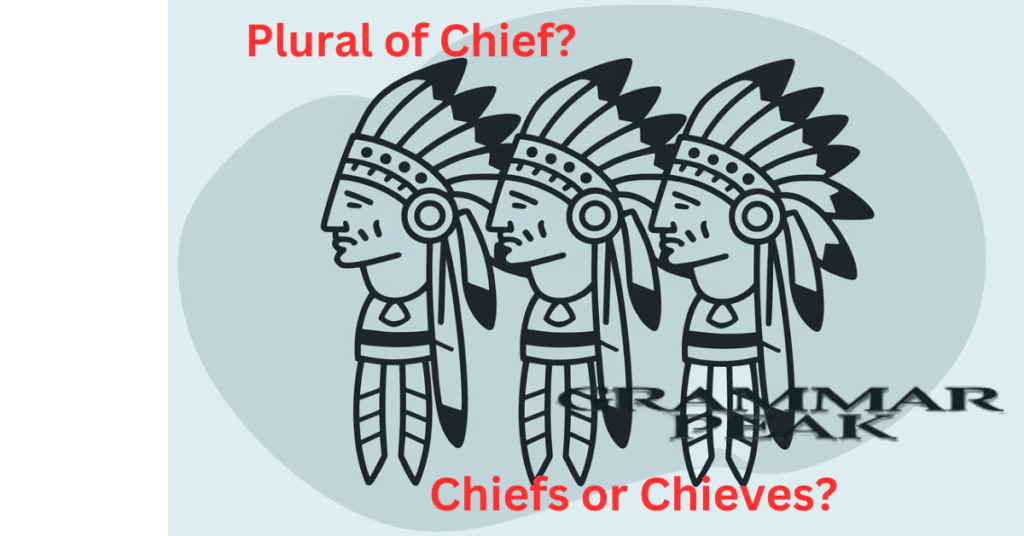The plural of the word “chief” is chiefs, not chieves. This follows the standard English grammar rules for pluralization. In English, when a word ends with a consonant followed by “f,” the “f” is typically changed to “ves” to form the plural. However, “chief” ends with “f,” but it retains the “f” in its plural form, resulting in chiefs.
Understanding why the plural is chiefs instead of chieves can be traced back to the word’s origins. “Chief” comes from the Old French word “chief,” which also uses a similar pluralization method. This historical context helps clarify the correct usage and reinforces the importance of adhering to established grammar rules in English.
What does “Chief” Mean?
The word chief refers to a leader or a person in charge. It can describe someone who holds a high position in an organization, such as a police chief or a chief executive officer. The term is flexible and can apply to various contexts, including military, academic, and tribal leadership.
For example, in Native American groups, the chief often plays a crucial role in decision-making and community guidance. In essence, a chief is someone who leads a group or organization. They are responsible for making important decisions and guiding their team.
Read more About What is the Plural of Chief? Chiefs or Chieves?
Chief Singular and Plural
When we talk about the singular form of “chief,” we refer to one leader. However, when we need to express more than one, we use the plural form, chiefs. This is a straightforward rule in English grammar.
Many people mistakenly think the plural is chieves. This confusion arises because of the way some words change in pluralization. However, the correct pluralization of “chief” follows the standard English rule of adding an “s” to the end of the word.
To illustrate, consider the following examples:
- Singular: The chief of the department made an announcement.
- Plural: The chiefs of various departments met for a conference.
Why the Plural of “Chief” is “Chiefs” not “Chieves”?
The reason the plural of chief is chiefs and not chieves lies in the rules of English grammar. In English, most nouns form their plurals by adding an “s” or “es.” The word “chief” ends with a consonant, so we simply add “s” to make it plural.
The confusion with chieves may stem from the influence of other languages, such as Old French or Latin. In Old French, the word for chief was “chief,” which also means leader. The Latin word “caput,” meaning head, is another root that influences the meaning of chief..
you might be What is the Plural of Chief? Chiefs or Chieves?
Singular and Plural Usage in Sentences
Singular Usage:
- The chief of the team made a crucial decision yesterday.
- As a chief, he is responsible for guiding his department.
- She was appointed as the chief financial officer last year.
- The chief of the group held a significant position in the community.
- Each chief must report to the council every month.
- The chief engineer presented the project updates at the meeting.
- His role as chief of operations is vital for the company’s success.
- The chief judge presided over the high-profile case.
- Every chief has the authority to enforce the rules within their domain.
- The chief diplomat worked tirelessly to negotiate peace.
Plural Usage:
- The chiefs of different organizations gathered for the annual conference.
- Many chiefs play a vital role in the decision-making process.
- The chiefs of state met to discuss international relations.
- Several chiefs from local groups attended the cultural event.
- The chiefs of various departments worked together on the initiative.
- The chiefs often form a task force in a crisis to respond quickly.
- The chiefs of the military branches held a joint training exercise.
- All the chiefs were invited to share their insights at the summit.
- The meeting included multiple chiefs representing different sectors.
- The chiefs expressed their concerns about the new policy changes.
Origin of “Chief”
The word chief has a rich history. It comes from the Old French word “chief,” which means leader or head. This term was derived from the Latin word “caput,” meaning head. Over time, the word evolved through Middle English and became part of the modern English vocabulary.
The historical context of chief reflects its importance in leadership roles across various cultures. From tribal leaders to modern executives, the term has been significant throughout history.
Synonyms for the Word “Chief”
- Leader
- Head of a group
- Person in charge
- Director
- Commander
- Principal
- Captain
- Supervisor
- Foreman
- Manager
- Administrator
- Executive
FAQ” S
What is the plural of chief?
The plural of chief is chiefs.
Why do people confuse chief and chieves?
The confusion arises from different pluralization rules in English and influences from other languages.
What does chief mean?
Chief refers to a leader or person in charge of a group or organization.
Can you give an example of chief in a sentence?
Yes, “The chief of the police department addressed the community.”
What are some synonyms for chief?
Synonyms include leader, head, director, and commander.
Conclusion
In conclusion, the plural of chief is chiefs, not chieves. Understanding this distinction is important for clear communication. The word “chief” has a rich history and a clear meaning, referring to a leader or person in charge. You can express your ideas more effectively using the correct plural form.

Mason Blake is an experienced blogger with a passion for language and communication. With years of expertise in crafting informative and engaging content, Mason shares valuable insights on grammar and writing. His clear, concise, and reader-friendly approach has earned him a loyal following, helping readers sharpen their language skills and master the art of effective communication.








Thank you for your sharing. I am worried that I lack creative ideas. It is your article that makes me full of hope. Thank you. But, I have a question, can you help me?
Thanks for sharing. I read many of your blog posts, cool, your blog is very good.
Your article helped me a lot, is there any more related content? Thanks!
Your point of view caught my eye and was very interesting. Thanks. I have a question for you.
Can you be more specific about the content of your article? After reading it, I still have some doubts. Hope you can help me.
Your point of view caught my eye and was very interesting. Thanks. I have a question for you.
Your article helped me a lot, is there any more related content? Thanks!